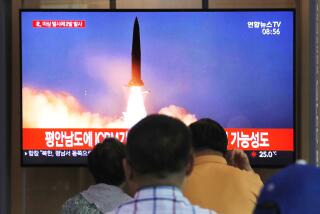A Sinister Hand Manipulates a Nuclear Crisis
- Share via
In “The Sum of All Fears,” the latest movie based on a Tom Clancy novel, terrorists hope to give rise to a new wave of international fascism. Realizing that it is impossible for the small group to topple the United States or Russia, one neo-fascist in the film explains the plan to pit the two nations against each other and obliterate them both: “Hitler wasn’t crazy, he was stupid. You don’t fight Russia and America. You get Russia and America to fight each other.”
Clancy’s scenario, as usual, is all too real. But in a post-Cold War twist, the U.S. and Russia are not the target.
Rather, terrorists hope to use the potential nuclear crisis between India and Pakistan to pursue their depraved ends. And rather than neo-fascists, the current emergency appears to be bred of a familiar catalyst: Osama bin Laden and his Al Qaeda followers. By taking on these terrorists in its own backyard, Pakistan has the ability to thwart Al Qaeda.
Cross-border incursions by terrorists based in Pakistan-controlled areas of Kashmir have increased in recent months.
The attacks and mounting death toll among Indian civilians led to a higher state of alert among the Indian military.
Reports from Indian intelligence claim terrorists trained by Al Qaeda have been among those killed by border troops.
Short of the destruction of the U.S., Bin Laden would love to see, and would certainly benefit from, the ruin of the anti-terrorist (and, some say, anti-Muslim) democracy in India.
Simultaneously, a war in South Asia provides Bin Laden with revenge-by-proxy on the primarily Muslim nation of Pakistan--a country that, instead of allying with Al Qaeda, is joining the U.S. on its Western border to help fight the war on terrorism.
As former Assistant Secretary of State Karl Inderfurth put it in a recent interview, Al Qaeda wants Pakistan and India to go to war because Pakistani President Pervez Musharraf is on Al Qaeda’s most-wanted list.
There is little doubt that Al Qaeda has been active in recruitment and training in the disputed Kashmir region.
As Newsweek reports this week, at least five Al Qaeda camps in Afghanistan were devoted to the training of Kashmiri militants before American and coalition military action put a lethal end to their activity.
Although there have been tensions and small regional conflicts between these neighboring countries for decades, the current conflict makes little sense: Neither country benefits from the flare-up, neither aims to annex the other, and the terrorism merely hardens India’s resolve against independence for Kashmir.
So the question remains: Who benefits?
If in fact Al Qaeda is fanning the flames, the current situation not only threatens the world with a nuclear war and divides Pakistan and India, it also drives a wedge between the U.S. and Musharraf, a valuable ally in the war on terror.
Rather than continuing to praise Musharraf’s efforts, President Bush must now demand that he do more to stop the cross-border incursions. Musharraf would be forced to do so at a time when the U.S. is relying on the Pakistani military to help seal the Pakistan-Afghanistan border and hunt terrorists fleeing and regrouping in the South Asian nation.
Musharraf made a difficult and potentially life-threatening decision in the days after Sept. 11. He bucked conventional wisdom and the Arab street to throw his support behind American efforts in Afghanistan and against many of the Muslim extremists in Islamabad.
This time, the bold leader must choose an even bolder action. He must change course and move against terrorists--or “freedom fighters,” depending on your point of view--on the Pakistani side of the Line of Control in Kashmir.
None of these actions will be popular within his nation’s borders.
In 1938, British Prime Minister Neville Chamberlain appeased Adolf Hitler’s Germany and declared “peace in our time.”
World War II began a year later.
If Musharraf can remember the mistakes of the past, and learn from recent success against terror, perhaps World War III will not be launched from Islamabad.
More to Read
Sign up for Essential California
The most important California stories and recommendations in your inbox every morning.
You may occasionally receive promotional content from the Los Angeles Times.












